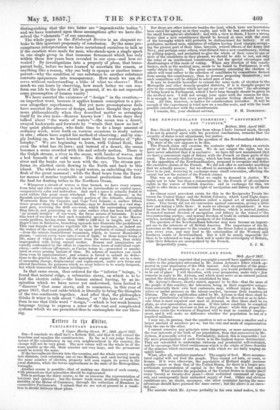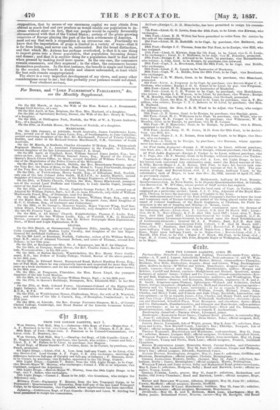POPULATIOLAND FOOD.
30th April 1867. Sin—I had rather expected that you might yourself have applied some corrective to the principles advocated in Mr. James Aytoun's letter which appeared in your impression of the 18th instant. Any discussion of the general principles of population in yo..r columns, you would probably consider to be out of place. I will therefore with your permission, make only %few remarks in reply to Mr. Aytoun, and which must serve as an earnest protest against the doctrine sought to be established by him. Mr. Aytoun's theory, shortly stated, appears to be this—that the mass of the people of this country, the labourers, being in their respective occupations materially their own best customers, may, without injury to 'themselves or undue pressure on the labour-market, increase their numbers ad libitum. The only qualification added by Mr. Aytoun is that there shall be a proper distribution of labour—that capital shall be directed so as to fabricate what is most required and most in demand, so that there shall be no gluts, no over-speculation, no manias. If this latter condition be complied with, the people may increase as fast as they please: while this proper distribution exists the workmen of England will be kept in constant employment, and it will make no difference whether the population be ten or a hundred millions.
I may say, in passing, that the question is not as between a smaller and a larger amount of numbers per se, but the rate and mode of augmentation from the one to the other.
I cannot conceive any principle more dangerous, or more antagonistic to the true interests of the bulk of our population, than that announced by Mr. Aytoun, if generally acted on. Fortunately, indeed, this is impossible ; but the mere promulgation of such views is in the highest degree detrimental. They are calculated to undermine virtuous and prudential self-restraint, and to encourage that blind recklessness which is the origin of three-fourths of the miseries which surround us, and with which we are daily waging an uphill battle. What, after all, regulates numbers? The supply of food. Mere accumulated capital will not feed the people. They cannot eat hats., or coats, or houses. If it were otherwise, the population of Holland might increase rapidly—more so than that of the United States, for there is a larger proportionate accumulation of capital in the first than in the last named country. What enables the population of the United States to double itself every twenty or twenty-five years ?—their unlimited command of virgin soil, and consequently their unlimited supply of food. Other and obvious conditions are' no doubt, necessary, else other countries having the same advantage should have pursued the same career; but the above is an essential one.
The mistake which Mr. Aytoun probably in his own mind makes, is the
supposition, that by means of our enormous capital we may obtain from abroad as much food and raw produce as would enable our population to increase without stint-in fact, that our people would be equally favourably circumstanced with that of the United States; certain of the grain-growing countries of Europe playing the part of the back settlements of America. I need not say that such a supposition is an erroneous one. Practically we know that the importation of grain is limited in a variety of ways-that it is far from being, and never can be, unbounded. But the broad distinction, and that which Mr. Aytoun has perhaps overlooked, is that it is one thing to import grain into a dense population, that population becoming denser and denser ; and that it is another thing for a population itself to find relief when pressed by making itself more sparse. In the one case, the consumers remain consumers, and they augment ; in the other, the consumers become themselves producers. In the first instance, the benefit is single and limited ; In the second, the benefit is double and almost unbounded, at least while the best soils remain unappropriated.
The above is a very imperfect development of my views, and many other considerations occur to me ; but this probably your patience would not stand.
Your obedient servant, L.
For Booxs, and. Lo RD PALMERSTON'S PARLIAMENT," &C. see the Monthly Supplement.



































 Previous page
Previous page